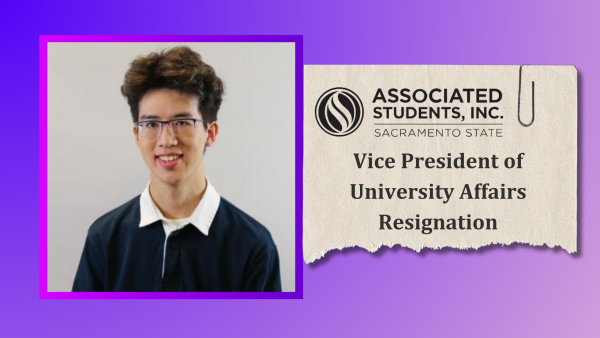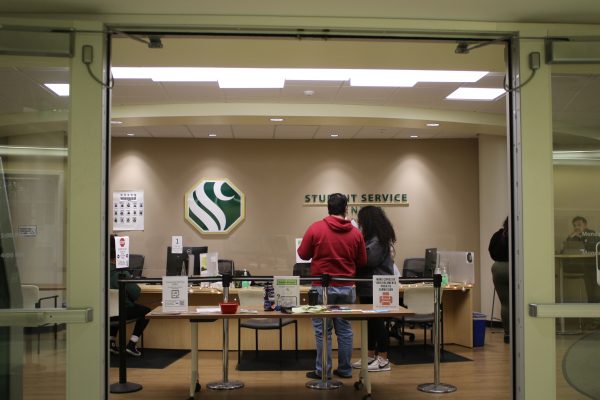Mapping the route of CSUS tuition fees
September 19, 2012
Tuition and campus fees may seem excessive, but the benefits offer more to students than simply access to education.
Associate vice president of budget planning and administration Stacy Hayano said the student tuition fees go toward the programs students are enrolled in, such as undergraduate, graduate, credential and post baccalaureate. The money is also used to pay for fund salaries, equipment, supplies and services.
Hayano said Sacramento State’s general operating fund budget is made up by two components: state appropriations and the student tuition fees. Together, they total to approximately $236 million for the 2012-2013 fiscal year.
Academic Affairs, the Administration and Business Affairs and the Information Resources & Technology departments are just some of the division levels receiving funding.
“The budget also funds tuition fee discounts which are State University Grants for students that are financially needy, (it) benefits costs and all university expenses,” Hayano said.
The university wide expenses include utilities, insurance, interpreters and accreditation costs.
Junior psychology major Bianca Posada said she is aware of some of the facilities and services available to students through the tuition and campus fees, but said she doesn’t use them as much as she would like to.
“I feel like I don’t use everything that I pay for,” Posada said. “I don’t have time to go to everything.”
However, Posada uses the pool, which is located behind Yosemite Hall and the computer labs.
Posada said she wished the campus fees would pay to build more parking lots and more classrooms especially now that budget cuts limit classrooms and seats.
Gina Lombardo, the director of transportation and parking administration, said the transportation fee makes funding available to Regional Transit, which then allows students to ride the RT buses, the light rail and receive a student commuter pass.
Lombardo said the transportation fee should be taken advantage of by students, especially if they do not have a vehicle to drive to and from campus.
“Even if a student has a vehicle, riding RT can save money on gas, parking fees and wear and tear on their vehicle,” said Lombardo. “Without this, riding RT could be very costly for the students if they had to pay per trip or purchase a monthly pass.”
The transportation fee is $18 for the 2012-2013 school year. Without it, the monthly permits from RT can cost more than $100 per month, said Lombardo.
Associate director of clinical operations Lisa R. Johnson said the $113 fee from the Student Health & Counseling Services that students pay provides basic medical, counseling and health promotion services.
“Student Health & Counseling Services include a walk-in urgent care clinic, appointment based primary care and women’s health, laboratory services, x-ray, pharmacy, vision center, individual and group counseling, psychiatry, nutrition counseling, alcohol, tobacco and other drug programs,” Johnson said.
It also includes violent support services, peer health educator programs, peer counseling programs and campus outreach activities.
These services give students the advantage of availability, convenience, cost, confidentiality and prevention, Johnson said.
“The mission of Student Health & Counseling Services (SHCS) is to enhance students’ educational experience by addressing health related barriers to learning, enabling students to make informed health decisions,” Johnson said. “And to promote the seven dimensions of wellness: intellectual, emotional, environmental, physical, career/financial, spiritual and socio-cultural.”
The health and counseling services are available at the WELL, as well as professional staff members.
“SHCS offers quality health care provided by a multidisciplinary team of medical and mental health professionals dedicated to making healthcare accessible and affordable for students through ethically sound practice, confidentiality and integrity,” Johnson said.
She said it is committed to quality care and service delivery and it is also accredited through the Accreditation Association for Ambulatory Health Care.
Johnson said students are encouraged to make an appointment for primary care services and counseling services, which can be made online by logging in to their website http://www.csus.edu/health/portalindex.html or by calling SHCS at 916-278-6461.
Freshman computer engineering major Kong Thao said he uses the fitness services at the WELL almost everyday and he suggests students should take advantage of it.
“They should (use the services) but it also depends,” said Thao. “Some students do have time and some, they have no time.”
Thao said he likes the workout equipment that the WELL provides and he would like to use the other health services in the future.
Johnson and Lombardo suggest taking advantage of the campus services and facilities, because students are the ones who pay for the services to be available.
Leticia Lopez can be reached at [email protected]








































































































































